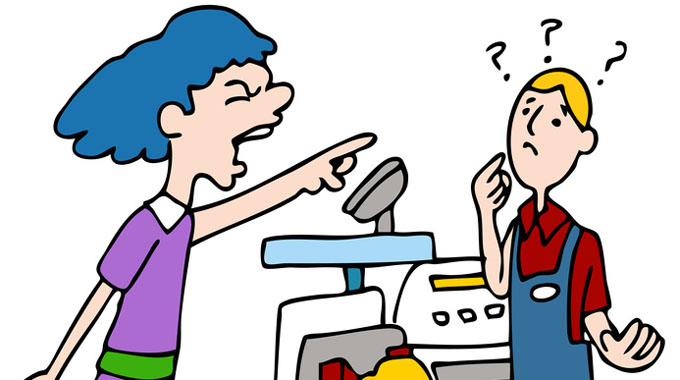
The Sunday Mail


Rude behaviour is awful, pervasive and toxic.
Customers’ behaviour cannot be controlled but organisations can try to manage them. It is depressing to have your day provoked by people with ill-mannered attitudes.
Remember, rude people are found everywhere. Think of the times that you have been caught up in a traffic jam or spent long hours or days queueing for essential services and the people that you have met in such situations.
Some have terrible but dismissive attitudes while some just drop venom at the slightest chance. Either way, such negativity can rub off our faces the wrong way and mess up our day.
From crabby colleagues to tetchy customers, anyone is capable of being rude but the power that separates leading companies from its followers lies in the ability to first find the reasons behind that behaviour. Successful organisations take time to research the real causes of grouchy individuals’ rude attitudes and their effects on the organisation’s reputation and bottom line.
Organisations do not get joy in firing customers because they know that it is very difficult to replace the customer. Besides, replacing lost customers comes with a heavy financial cost. So even the rude customers are a very important asset to the organisation that must be understood and managed in such a way that the organisation remain the number one priority.
Nonetheless, some actions or lack of by some organisations are the real drivers of customer rudeness. This means it is crucial for organisations to do an introspection on its operations and customer care service strategies before putting the blame on anyone.
These are some of the things that organisations do that cause customers to be rude:
- Poor customer experience
Poor customer experience can vary from rude staff, product failure or even system failure. Some staff members lack the required skills to deal with customers and are guilty of lacking the people person skills. This skill deficit usually results in unpleasant encounters with customers and can actually swing them to rival organisations.
Most employees whose job description does not involve direct interaction with the customers on a regular basis, fail to appreciate the need to, at least, try to be nice to customers in rare chances that they finally meet them face-to-face.
Employees that work at the back office, like finance and accounting personnel, lack this skill as they are used to dealing with figures and not people.
Training such employees in good customer service will enhance the customer experience especially when a rare opportunity arises that they are supposed to deal directly with customers. It is the duty of every employee to be able to douse off a tiff involving their organisation and its customers by providing excellent customer experience rather than inflame it.
- Listening Skills
Customers are inclined to be rude when they deal with organisations that lack active listening skills. When customer service personnel engage a customer, they should always make sure that they give the customer full attention. This is because some customers when they do not get that attention, they feel like they are being ignored or that their importance to the organisation is being belittled, while some feel as if they are being disregarded.
I remember an incident at one of the famous food outlets where a customer was placing an order and before they finished placing the order, the front office lady turned her head to check if the specific orders where in stock.
This did not go down well with the patron who started shouting at the lady for not paying attention while he was talking and challenged the lady to provide him with the correct order if she was listening to what he ordered. This created a mini-scene and a bit embarrassing to the entire staff who were on duty that day.
- Failure to meet product expectations
When customers visit an organisation they have certain expectations of the product or service that they are going to spend their money on. They always feel cheated when the product or service fail to meet those expectations. Customers end up being rude when an organisation fails to give a satisfactory explanation on why the product or service fall short.
Sometimes organisations exaggerates the use or power of their product and when the customer finds out that it is not case, it may injure the customer’s relationship with the organisation. The customer trust on the organisation’s ability to deliver is almost certainly crushed by this failure.
- Failed Promises
When organisations make promises that they do not intend to keep, it creates displeasure. It is important for customer service personnel to make sure that they keep track of what they would have promised their customers and act on them. Customers are individuals that plan their lives based on promises given to them and if that is not fulfilled on time, they may end up disgruntled and become rude when following up on the failed promise.
Blips like these require organisations to apologise and compensate, if need be, especially if their failed promise resulted in a loss to the customer. Such actions reduce the strain on the customer-organisation relationship.
- Poor Customer Service
Bad customer service results in bad customer experience and this can be in the form of response time or quality of service. Slow response to a crisis or poor service quality can trigger customers to be rude. Customers, as the owners of the business through their patronage, feel that they should be the first priority when they make a call to the organisation. This is correct because organisations survive by customer spending and they should make sure that the same customers remain loyal and spend more and this can only be done if they get top-notch excellent customer service always.
Cresencia Marjorie Chiremba, is a marketing enthusiast with a strong passion for customer service. For comments and suggestions, she can be reached on [email protected] or on 0712 979 461



